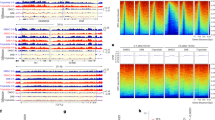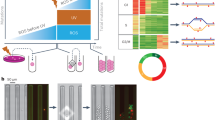Abstract
Many human tumours have length alterations in repetitive sequence elements1. Although this microsatellite instability has been attributed to mutations in four DNA mismatch repair genes in hereditary nonpolyposis colorectal cancer (HNPCC) kindreds2,3, many sporadic tumours exhibit instability but no detectable mutations in these genes4–6. It is therefore of interest to identify other genes that contribute to this instability. In yeast, mutations in several genes, including RTH and MSH3, cause microsatellite instability7–11. Thus, we screened 16 endometrial carcinomas with microsatellite instability for alterations in FEN1 (the human homolog of RTH) and in MSH3 (refs 12–14). Although we found no FEN1 mutations, a frameshift mutation in MSH3 was observed in an endometrial carcinoma and in an endometrial carcinoma cell line. Extracts of the cell line were deficient in repair of DNA substrates containing mismatches or extra nucleotides. Introducing chromosome 5, encoding the MSH3 gene, into the mutant cell line increased the stability of some but not all microsatellites. Extracts of these cells repaired certain substrates containing extra nucleotides, but were deficient in repair of those containing mismatches or other extra nucleotides. A subsequent search revealed a second gene mutation in HHUA cells, a missense mutation in the MSH6 gene. Together the data suggest that the MSH3 gene encodes a product that functions in repair of some but not all pre-mutational intermediates, its mutation in tumours can result in genomic instability and, as in yeast, MSH3 and MSH6 are partially redundant for mismatch repair.
This is a preview of subscription content, access via your institution
Access options
Subscribe to this journal
Receive 12 print issues and online access
$209.00 per year
only $17.42 per issue
Buy this article
- Purchase on Springer Link
- Instant access to full article PDF
Prices may be subject to local taxes which are calculated during checkout
Similar content being viewed by others
References
Eschelman, J.R. & Markowitz, S.D. Microsatellite instability in inherited and sporadic neoplasms. Current Opin. Oncol. 7, 83–89 (1995).
Rhyu, M. Mechanisms underlying hereditary nonpolyposis colorectal carcinoma. J. Natl. Cancer Inst. 88, 240–251 (1996).
Kolodner, R. Biochemistry and genetics of eukaryotic mismatch repair. Genes & Dev., in press (1996).
Liu, B. et al. Mismatch repair gene defects in sporadic colorectal cancers with microsatellite instability. Nature Genet. 9, 48–55 (1995).
Borresen, A.-L. et al. Somatic mutations in the hMSH2 gene in microsatellite unstable colorectal carcinomas. Hum. Mol. Genet. 4, 2065–2072 (1995).
Katabuchi, H. et al. Mutations in DNA mismatch repair genes are not responsible for microsatellite instability in most sporadic endometrial carcinomas. Cancer Res. 55, 5556–5559 (1995).
Strand, M., Prolla, T.A., Liskay, R.M. & Petes, T.D. Destabilization of tracts of simple repetitive DNA in yeast by mutations affecting DNA mismatch repair. Nature 365, 274–276 (1993).
Strand, M., Earley, M.C., Crouse, G.F. & Petes, T.D. Mutations in the MSH3 gene preferentially lead to deletions within tracts of simple repetitive DNA in Saccharomyces cerevisiae . Proc. Natl. Acad. Sci. USA 92, 10418–10421 (1995).
Johnson, R.E., Kovvali, G.K., Prakash, L. & Prakash, S. Requirement of the yeast RTH1 5′ to 3′ exonuclease for the stability of simple repetitive DNA. Science 269, 238–240 (1995).
Marsischky, G.T., Filosi, N., Kane, M.F. & Kolodner, R. Redundancy of Saccharomyces cerevisiae MSH3 and MSH6 in MSH2-dependent mismatch repair. Genes Dev 10, 407–420 (1996).
Johnson, R.E., Kovvali, G.K., Prakash, L. & Prakash, S. Requirement of the yeast MSH3 and MSH6 genes for MSH2-dependent genomic stability. J. Biol. Chem. 271, 7285–7288 (1996).
Hiroaka, L.R., Harrington, J.J., Gerhard, D.S., Lieber, M.R. & Hsieh, C.L. Sequence of human FEN-1, a structure-specific endonuclease, and chromosomal localization of the gene in mouse and human. Genomics 25, 220–225 (1995).
Fujii, H. & Shimada, T. Isolation and characterization of cDNA clones derived from the divergently transcribed gene in the region upstream from the dihydrofolatereductasegene. J. Biol. Chem. 264, 10057–10064 (1989).
Watanabe, A., Ikejima, M., Suzuki, N. & Shimada, T. Genomic organization and expression of the human MSH3 gene. Genomics 31, 311–318 (1996).
Modrich, P. Mechanisms and biological effects of mismatch repair. Annu. Rev. Genet. 25, 229–253 (1991).
Iaccarino, I. et al. MSH6, a Saccharomyces cerevisiae protein that binds to mismatches as a heterodimer with MSH2. Curr. Biol. 6, 484–487.
Papadopoulos, N. et al. Mutations of GTBP in genetically unstable cells. Science 268, 1915–1917 (1995).
New, L., Liu, K. & Crouse, G.F. The yeast gene MSH3 defines a new class of eukaryotic MutS homologues. Mol. Gen. Genet. 239, 97–108 (1993).
Koi, M. et al. Normal human chromosome 11 suppresses tumorigenicity of human cervical tumor cell line SiHa. Mol. Carcinogenesis 2, 12–21 (1989).
Koi, M. et al. Human chromosome 3 corrects mismatch repair deficiency and microsatellite instability and reduces N-Methyl'-N-nitrosoguanidine tolerance in colon tumor cells with homozygous hMLH1 mutation. Cancer Res. 54, 4308–4312 (1994).
Umar, A. et al. Defective mismatch repair in colorectal and endometrial cancer cell lines exhibiting microsatellite instability. J. Biol. Chem. 269, 14367–14370 (1994).
Risinger, J.I., Umar, A., Barrett, J.C. & Kunkel, T.A. AhPMS2 mutant cell line is defective in strand-specific mismatch repair. J. Biol. Chem. 270, 18183–18186 (1995).
Shibata, D., Peinado, M.A., Ionov, S., Malkhosyan, S. & Perucho, M. Genomic instability in repeated sequences in an early somatic event in colorectal tumorigenesis that persists after transformation. Nature Genet. 6, 273–281 (1994).
Umar, A. & Kunkel, T.A. DNA replication fidelity, mismatch repair and genome instability in cancer cells. Eur. J. Biochem. 238, 297–307 (1996).
Modrich, R. & Lahue, R. Mismatch repair in replication fidelity, genetic recombination and cancer biology. Annu. Rev. Biochem. 65, 101–133 (1996).
Palombo, F. et al. GTBP, a 160 kD protein essential for mismatch binding activity in human cells. Science 268, 1912–1914 (1995).
Drummond, J.T., Li, G.-M., Longley, M.J. & Modrich, P. Mismatch recognition by an hMSH2-GTBP heterodimer and differential repair defects in tumor cells. Science 268, 1909–1912 (1995).
Kat, A. et al. An alkylation-tolerant, mutator human cell line is deficient in strand specific mismatch repair. Proc. Natl. Acad. Sci. USA 90, 6424–6428 (1993).
Hawn, M.T. et al. Evidence for a connection between the mismatch repair system and the G2 cell cycle checkpoint. Cancer Res. 55, 3721–3725 (1995).
Baker, S.M. et al. Male mice defective in the DNA mismatch repair gene PMS2 exhibit abnormal chromosomal synapsis in meiosis. Cell 82, 309–320 (1995).
Mellon, I. et al. Transcription-coupled repair deficiency and mutations in human mismatch repair genes. Science 272, 557–560 (1996).
Risinger, J.I. et al. Microsatellite instability in gynecological sarcomas and in hMSH2 mutant uterine sarcoma cell lines defective in mismatch repair activity. Cancer. Res. 55, 5664–5669 (1995).
Risinger, J.I. et al. Genetic instability of microsatellites in endometrial carcinoma. Cancer Res. 53, 5100–5103 (1993).
Genome Database,The human genome data base project. Baltimore: Johns Hopkins University. World wide web, http://gdbwww. gdb. org/gdb/ browser/docs/topq. html. (1995).
Liu, B. et al. Genetic instability occurs in the majority of young patients with colorectal cancer. Nature Med. 1, 348–352 (1995).
Chomcyznski, P. & Sacchi, N. Single step method of RNA isolation by guanidium thiocyanate-phenol-chloroform extraction. Analyt. Biochem. 162, 156–159 (1987).
Liu, B. et al. hMSH2 mutations in hereditary nonpolyposis colorectal cancer kindreds. Cancer Res. 54, 4590–4594 (1994).
Nicolaides, N.C. et al. Molecular cloning of the N-terminus of GTBP . Genomics 31, 395–397.
Thomas, D.C., Umar, A. & Kunkel, T.A. Measurement of heteroduplex repair in human cell extracts. in METHODS: A Companion to Methods In Enzymotogy 7 (ed. Friedberg, E.G.) 187–197 (Academic Press, 1995).
Author information
Authors and Affiliations
Corresponding author
Rights and permissions
About this article
Cite this article
Risinger, J., Umar, A., Boyd, J. et al. Mutation of MSH3 in endometrial cancer and evidence for its functional role in heteroduplex repair. Nat Genet 14, 102–105 (1996). https://doi.org/10.1038/ng0996-102
Received:
Accepted:
Issue Date:
DOI: https://doi.org/10.1038/ng0996-102
This article is cited by
-
MutSβ exceeds MutSα in dinucleotide loop repair
British Journal of Cancer (2010)
-
Activity (transcription) of the genes for MLH1, MSH2 and p53 in sporadic colorectal tumours with micro-satellite instability
British Journal of Cancer (2004)
-
Role of BRCA1 in cellular resistance to paclitaxel and ionizing radiation in an ovarian cancer cell line carrying a defective BRCA1
Oncogene (2003)
-
Somatic mutation of hPMS2 as a possible cause of sporadic human colon cancer with microsatellite instability
Oncogene (2000)
-
HNPCC-like cancer predisposition in mice through simultaneous loss of Msh3 and Msh6 mismatch-repair protein functions
Nature Genetics (1999)



